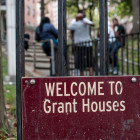
Juvenile Justice Week in Review: Tough Love or Abuse?
|
This week's top headlines in juvenile justice.
Juvenile Justice Information Exchange (https://jjie.org/page/264/)

In late September, Torri was driving down the highway with her 11-year-old son Junior in the back seat when her phone started ringing.
It was the Hamilton County Sheriff’s deputy who worked at Junior’s middle school in Chattanooga, Tennessee. Deputy Arthur Richardson asked Torri where she was. She told him she was on the way to a family birthday dinner at LongHorn Steakhouse.
“He said, ‘Is Junior with you?’” Torri recalled.
Earlier that day, Junior had been accused by other students of making a threat against the school. When Torri had come to pick him up, she’d spoken with Richardson and with administrators, who’d told her he was allowed to return to class the next day. The principal had said she would carry out an investigation then. ProPublica and WPLN are using a nickname for Junior and not including Torri’s last name at the family’s request, to prevent him from being identifiable.
When Richardson called her in the car, Torri immediately felt uneasy. He didn’t say much before hanging up, and she thought about turning around to go home. But she kept driving. When they walked into the restaurant, Torri watched as Junior happily greeted his family.
Soon her phone rang again. It was the deputy. He said he was outside in the strip mall’s parking lot and needed to talk to Junior. Torri called Junior’s stepdad, Kevin Boyer, for extra support, putting him on speaker as she went outside to talk to Richardson. She left Junior with the family, wanting to protect her son for as long as she could ...

This week's top headlines in juvenile justice.

I don’t like the phrase “restorative justice,” even though I use it often. Why? Too many people associate it only with the police, courts, probation officers and other facets of the criminal justice system.

After Reporter Daryl Khan's reporting and subsequent radio interview about the largest raid in NYCPD's history, officials have come forward to formulate and discuss plans for law enforcement in the wake of the arrests.

NEW YORK — The residents of the Manhattanville and Grant Houses in West Harlem have a new touchstone, a specific moment to organize their collective memory, a way to divide their lives. Just a month after the New York Police Department conducted the largest raid in the city’s history, the residents who experienced it have a way to refer to their lives in clear “before and after” terms, like old historical abbreviations B.C. and A.D.
In the Manhattanville and Grant Houses there was life before The Raid and life after The Raid. Life has gone on, but it has changed, residents and activists say.

Amid the cinderblock walls and standard-issue wooly gray bed linens, intimate details abound. These may be the cells of kids serving time as opposed to time-outs, but they are still the personal spaces of children.

States shifting away from isolation provide compelling evidence that solitary can, in fact, be banned or restricted without jeopardizing the security of facilities or endangering staff or juveniles housed in them. Check out JJIE's latest story series covering the use of juvenile solitary confinement to learn more.

What happens when someone asks, "What exactly should we do with youth in the system if we aren't going to lock them up?"

Investigating at the pervasiveness of abuse at residential homes for troubled teens.